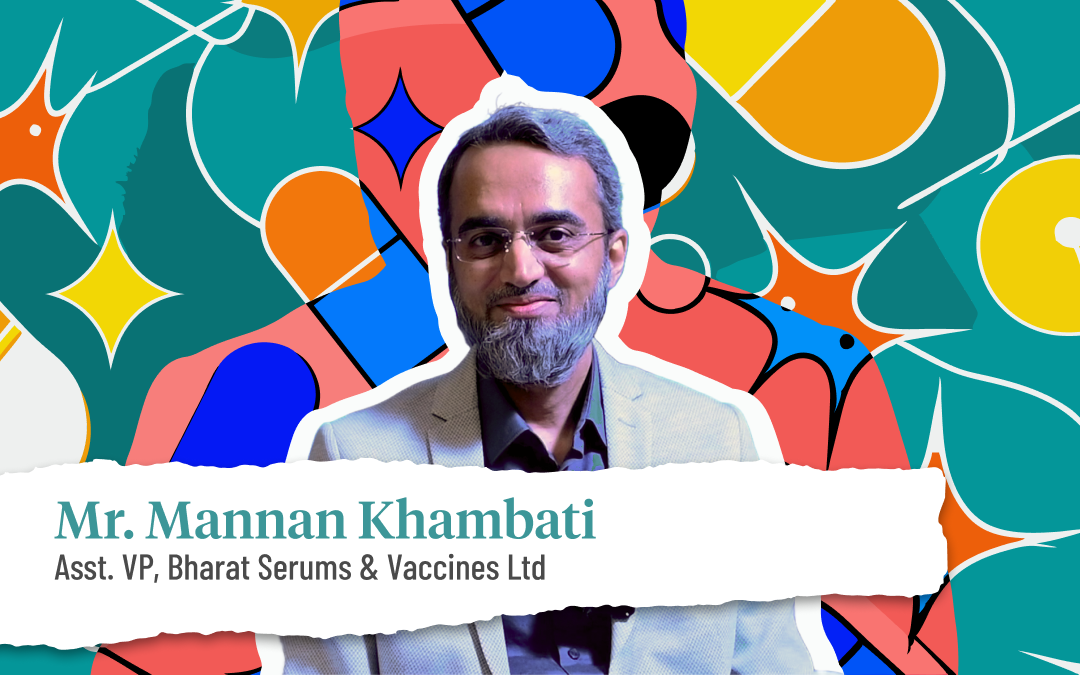QnA
Interview | July 22, 2025
Dr. Mahesh Saini is the Assistant Vice President (Quality) at Cadila Pharmaceuticals, where he leads the company’s quality strategy, oversight, and compliance initiatives across its manufacturing and R&D operations. With over two decades of industry experience at leading firms such as USV, Cipla, Mylan, and Sun Pharma, Mahesh has earned a reputation for transforming regulatory challenges into growth opportunities. He has led critical remediation efforts—including FDA warning letter responses—and helped commission state‑of‑the‑art facilities with robotics and isolator systems. Known for his dedication to mentoring, scientific rigor, and a systems view of quality, Mahesh champions a culture where compliance, reliability, and innovation converge to drive pharmaceutical excellence.
Pharma Now: Mr. Mahesh, welcome to the show. Thank you for taking the time to speak with us. To begin with, our audience is always eager to hear about real-world journeys and experiences. You have decades of experience, having started as a microbiologist and now serving as a quality head. Let’s begin with your career path. How did you start as a microbiologist and eventually transition into the pharmaceutical industry?
Mr. Mahesh: It's been a very interesting journey. I’m a postgraduate in microbiology and currently have two decades of experience. I started my career as a microbiologist after completing my postgraduate studies from MDS University, Ajmer, with first-class grades. Initially, my plan was to pursue a career in academics, possibly become a lecturer or professor, maybe even pursue a Ph.D.
I joined one of the colleges and began teaching both undergraduate and postgraduate students. During that time, I came into contact with an industrialist who had also started his career as a professor before moving into the pharmaceutical industry. He shared his journey with me and explained how, by entering the industry, he felt he was able to make a greater contribution to human life. He believed that by applying our theoretical knowledge practically, especially in making medications, we could create a more meaningful impact.
That conversation left a strong impression on me. He was a microbiologist too, and when he spoke about the scope of impacting lives through medicine, I was inspired. That’s when I decided to join the pharmaceutical industry as a microbiologist.
Since I had a postgraduate degree in microbiology, I initially set up the plant laboratory for microbiology and quality control. Later, I received an opportunity with another organization where I was offered a role in the quality control department. Given my background in microbiology, I thought of expanding my expertise into the chemical side of quality control as well. That experience gave me significant exposure.
As I continued to seek more responsibilities and deeper knowledge, I became curious about what was happening in the Quality Assurance (QA) function. I decided to explore QA, and that’s how I transitioned into it. QA turned out to be a core function, right at the forefront of regulatory inspections, system implementation, managing non-compliances, and day-to-day troubleshooting, ultimately ensuring patient compliance. It’s been a very interesting and enriching journey.
I joined Orchid Chemicals and Pharmaceuticals in 2007. Before that, I began my career with a phyto-extracts company and then moved to a biotech firm where we were manufacturing protein molecules, including insulin and growth hormones. Orchid, on the other hand, was a chemical industry focused on active pharmaceutical ingredients, the raw materials used to make formulations.
At Orchid, I gained experience in Quality Assurance, working across different areas such as IPQA, validations, and QMS. By that time, I already had a solid foundation in quality control and microbiology.
I got the opportunity to join Cipla in Indore, where I was part of a new plant. It was a great learning experience from the ground up, right from plant conception to commissioning, qualifications, and eventually filing for regulatory markets. This also included facing pre-approval inspections and moving towards successful commercialisation.
Later, I joined Mylan Laboratories, a US-based multinational company. At that time, the company was under a USFDA warning letter. I had the opportunity to work closely with consultants from the US, and we worked hand-in-hand on remediation. Eventually, the warning letter was successfully lifted.
Along with supporting the existing facility at Mylan, I was also leading the development of a new complex injectable facility. After Mylan, I got an opportunity with Sun Pharma in February 2017. This particular plant was dealing with a USFDA warning letter at the time.
During the interview, the Quality Head asked why I would want to join a site facing such a serious challenge. I told him that I had relevant experience, and I wanted to use that knowledge to contribute meaningfully. I joined the team despite being fully aware of the challenge, it had been clearly communicated by the recruiter as well.
When I joined, the impacted plant wasn't manufacturing anything. In the case of a warning letter, the site is under immense pressure. Until the compliance issues are resolved, manufacturing for the US market is halted, and the site is essentially blacklisted.
There was a consultant stationed at the plant to review every document before a batch could be released. We undertook a full remediation program, which included refurbishing plant equipment, strengthening the Quality Management System, improving change control procedures, and refining how investigations were handled.
Given my background in teaching, I also took on the role of trainer. I trained investigators and quality approvers to improve the quality of investigations. We were facing challenges with a couple of products that had been dropped from manufacturing due to quality issues. So, we collaborated with the R&D team, revised the methodologies, enhanced the products, and successfully relaunched them.
Then we had a commitment to set up new facilities because the old ones had certain concerns. I was entrusted with one of the plants, and I used my knowledge of facility setup to take on that challenge. It was a state-of-the-art facility where we implemented cutting-edge technologies, including isolator-based systems. Within a defined timeline, we successfully erected the plant, commissioned and qualified it, and produced exhibit batches that were submitted to the FDA.
After that, there was another facility facing challenges. This one was also a sophisticated plant, equipped with robotics and isolator systems. It followed a “plant-in-plant” concept, where multiple production units operated within the same facility.
So I took that challenge, and after Sun Pharma, I got an opportunity with Neprod Life Sciences. I manage two plants, one focused on oncology and the other a general facility. I lead the entire quality function, including QA, QC, and microbiology, with a team of over 170 people.
When I joined, we faced a significant challenge in obtaining EU approvals, as we were primarily operating in the domestic market. However, with my experience, skills, and the dedicated efforts of the team, we successfully secured the EU approval along with several other important regulatory clearances.
Taking on such challenges is crucial. Often, people hesitate to step into difficult situations. But if you truly want to grow, you need to embrace these challenges. Anyone can work in a stable, smooth-running environment, but real growth comes from navigating adversity.
Pharma Now: I really want to circle back to your experience of taking an organisation from a grave situation and bringing it back to production. But before we dive into that, during your introduction, you mentioned both QA and QC. For the benefit of our audience, could you help us understand what the difference is between QA and QC?
Mr. Mahesh: Quality Assurance, or QA, is about ensuring the quality of the product through predefined systems and practices. In pharmaceuticals, we cannot test every single unit, if we did, nothing would reach the market. Instead, we test a strategic, stratified sample: some vials from the beginning of the batch, some from the end, and others at intervals in between. That sample represents the entire batch.
To justify that approach, regulatory bodies require us to follow Good Manufacturing Practices (GMP). These are the conditions and processes we must comply with to ensure overall quality without exhaustive testing.
QA is the function that Designs and maintains the quality system, including all GMP protocols. Monitors compliance, conducting gap analyses and internal audits. Leads inspections and interacts with regulators. Implements corrective and preventive actions, and advises on day-to-day problem solving in line with regulatory requirements.
In short, QA builds, monitors, and continuously improves the framework that guarantees product quality under GMP constraints.
Quality Control, or QC, is a crucial part of the overall quality system, but it focuses more on the operational aspects, specifically, the testing of the product. Once a product is manufactured and sampled by QA, it goes to QC for analysis. So, if manufacturing is one part, QC is the other, dedicated to testing. QC ensures the product meets the required specifications before release.
QA, in turn, oversees and verifies QC’s work, ensuring that records are contemporaneous, correct, complete, adequate, and compliant with validated conditions and regulatory expectations.
In essence, QA builds and enforces the quality system, while QC operates within it to test the product. QC itself is divided into two key areas: chemical testing and microbiological testing.
Pharma Now: You also talked about warning letters. I think there's a lot of buzz around them. Once an organisation gets a warning letter, I’ve seen the stock go up and down. What is this all about, warning letters?
Mr. Mahesh: As we discussed, there are regulations made by different regulatory agencies, bodies responsible for ensuring that the medicinal products used in their countries are of adequate quality, safe for patients, and effective for treatment. These agencies expect that patients receive the intended benefit from medicines without any unexpected or harmful effects.
To ensure this, there are established guidelines like GMP (Good Manufacturing Practices), GLP (Good Laboratory Practices), GDP (Good Distribution Practices), and proper documentation practices. If we fail to meet these expectations, regulatory authorities such as the USFDA or others will inspect and evaluate us.
Typically, inspections happen during initial certifications or as part of regular surveillance to confirm whether we’re adhering to what we've submitted in our regulatory filings. If they find that we’re not meeting the required standards, they issue citations. For instance, the USFDA issues what's called a Form 483 when they observe non-compliances. This document outlines the observations made during the inspection.
Once a Form 483 is issued, the manufacturing site is given a timeline to respond with corrective and preventive actions. If the FDA finds those responses satisfactory, the issue is closed, and approval is maintained. However, if the response isn’t adequate or doesn’t meet their expectations, the FDA issues a Warning Letter. This is a serious indication that the facility needs to improve its systems urgently.
A warning letter isn’t a ban, but it signals that unless improvements are made, further action will follow. If, even after that, the issues are not resolved or are critical to patient safety, the FDA may issue an FDA Alert. This means shipments from that facility are no longer allowed into the U.S. and will be stopped at the border. If the situation still doesn’t improve, and there are serious risks to patient health, the next level of enforcement is a Consent Decree, which is a legal agreement and a punitive action against the manufacturer. So, it’s a step-by-step escalation. In their evaluation, they are determining whether we fit the requirements.
PharmaNow: Mahesh, you’ve always been known as a crisis management person. For our audience, I’d like to understand a couple of your experiences. When you step into a sinking ship and manage to save it completely, what does that process look like?
Mr. Mahesh: It’s not only me, actually, it’s the team, and the organisation’s management, that make it possible. What we essentially do is navigate the situation carefully. We study everything line by line, understand the regulatory requirements, and draw from past experience to interpret what the regulators are truly expecting.
During my time at Cipla, for example, we worked closely with some very well-respected consultants. At both Cipla and Mylan, we also worked with Lachman Consultants, who brought deep expertise in regulatory science and risk-based decision-making.
All of this helped us develop a solid understanding of the regulations and the rationale behind them. That understanding is critical, not just knowing what to do, but why it should be done that way. This forms the foundation of building a strong compliance strategy that actually works.
Pharma Now: You’ve climbed the ladder, from being a lecturer to entering the pharmaceutical industry, starting at the ground level, setting up labs, and now leading as a Quality Head. I’d really like to understand the evolution of your role. Could you talk about the key differences in the responsibilities you've handled at each stage?
Mr. Mahesh: I’ve had the learning kind of mindset from the very beginning. It was never about just doing the work for the sake of it; there was always a sense of learning and a strong sense of responsibility. Whatever I was doing, I wanted it to be done perfectly. I never believed in depending on someone else to check or correct my work. There has always been a sense of ownership. So, for me, it’s about the completeness of the work and the effectiveness with which it’s done.always been a sense of ownership. So, for me, it’s about the completeness of the work and the effectiveness with which it’s done.
Pharma Now: You spoke about ownership, and I believe that’s become a crucial term in today’s management conversations. There’s often a sentiment that ownership is lacking among professionals or team members. And without ownership or genuine passion for the work, the quality may not be up to the mark. What are your thoughts on that?
Mr. Mahesh: Exactly. Ownership is absolutely essential. If we’re doing the work without planning it ourselves, it becomes difficult to manage. Often, there’s pressure from multiple directions and tight timelines. In such situations, it’s important to categorise tasks, what’s urgent and what’s important, and prioritise accordingly. We must always put 100% effort into the work and aim for perfection. At the same time, we should have the mindset that "I am responsible for this, I am accountable for the outcome. That sense of ownership always leads to better results."
Pharma Now: That's a good point. I agree. How does your day look in terms of a quality head?
Mr. Mahesh: Yes, it’s part of the job, actually. There are regular team meetings, and at the end of the day, our goal is to deliver a quality product. We believe both quality and supply are important. If you're not supplying a quality product, there’s no meaning in supplying it at all. On the other hand, if you're aiming for quality but there’s no clear navigation to achieve it in a timely manner, it also doesn't help, because the patient is waiting for that medication.
So, there’s a time-bound approach we follow. As a team, we discuss production plans, starting with yearly plans, then monthly, weekly, and daily. At the same time, we review ongoing quality aspects: what issues are arising, how we can troubleshoot them in a quality-focused way, and how our systems are performing through validation activities. We also stay aware of emerging trends in daily operations.
We conduct shop floor rounds to get a real sense of what’s happening on the ground, which is very important. We engage with different sections, meet the section leaders which gives the team a sense that someone is checking in, someone cares. It also gives us an opportunity to understand how each section is functioning and whether they need any support from management to solve their challenges.
Pharma Now: How would you describe your learning mantra? What is your learning style? How do you keep yourself up-to-date? What type of person are you? Are you a book person?
Mr. Mahesh: Any science student, especially from a biology background, often aspires to become a doctor or enter the medical field. I had a similar plan. But eventually, I transitioned into the pharmaceutical business. Looking back, it wasn't a thoroughly planned decision to enter pharma. I started as a microbiologist, initially wanted to become a doctor, then worked as a lecturer, and later moved into the pharma industry.
Today, I feel proud. A doctor may impact the lives of a number of people—perhaps in a village or a city but the medicines we produce in pharma impact lives across the globe. There’s immense satisfaction in knowing that if we provide a quality product, we’re positively influencing the health of millions of people worldwide.
Pharma Now: Don’t you feel scared being in quality? We read a lot about products causing harm, some medicines not being of good quality and creating damage.
Mr. Mahesh: That usually happens when there’s only a focus on production, without science or proper risk management in place. There's no planning at all about quality. We follow the concept of Quality by Design. When developing a product, we focus on both patient safety and product quality. We consider how the product will act in the patient’s body, whether it will be beneficial, and what could potentially go wrong. We evaluate every aspect from the product's performance to its composition. All these elements are thoroughly considered and controlled.
Pharma Now: So, towards the conclusion, I'd really like one message from you for upcoming pharmacists who are looking forward to a career in the pharma industry. What would be your one leadership mantra?
Mr. Mahesh: Yes. If I had to say just one thing, it would be this: It is not just a job. You have a responsibility toward so many people. because you are impacting the lives of millions, even billions. Always approach your work with that awareness. Understand the science, understand the risks, and give your 100% honest effort. Don’t treat it like just another task. Take full ownership and responsibility. That mindset is crucial, especially when making decisions related to quality.
Pharma Now: Wonderful. I think that’s really well said. The word “ownership” that you used—it’s so important nowadays. Taking ownership, putting passion into your work, and focusing on the quality you deliver, that’s what truly makes a difference. Your experience and wisdom are truly amazing. Thank you so much for contributing and for joining us on the show.
Mr. Mahesh: Thank you so much for giving me this opportunity. It’s been a pleasure.

FT - Dr. Subhash Thuluva

FT - Ms. Rajni Jha

FT - Mr. Mannan Khambati

FT - Dr. Pratima Srivastava

FT - Dr. Subhash Thuluva
Dr. Subhash Thuluva, Senior VP at Biological E, shares his 25-year journey in clinical development, ...

FT - Ms. Rajni Jha
Ms. Rajni Jha, a seasoned pharmaceutical specialist, shares her journey from the lab to becoming a l...

FT - Mr. Mannan Khambati
Mr. Mannan Khambati, AVP of Biotech Manufacturing at Bharat Serums and Vaccines, shares his inspirin...

FT - Dr. Pratima Srivastava
Dr. Pratima Srivastava, Vice President at Aragen, shares her remarkable journey from aspiring scient...